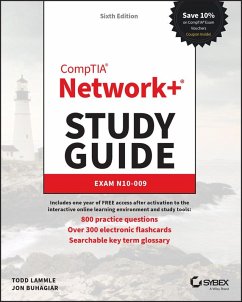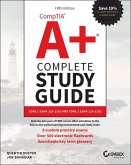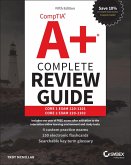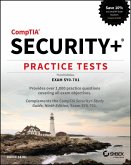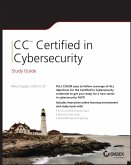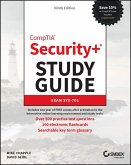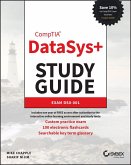

Alle Infos zum eBook verschenken

- Format: PDF
- Merkliste
- Auf die Merkliste
- Bewerten Bewerten
- Teilen
- Produkt teilen
- Produkterinnerung
- Produkterinnerung

Hier können Sie sich einloggen

Bitte loggen Sie sich zunächst in Ihr Kundenkonto ein oder registrieren Sie sich bei bücher.de, um das eBook-Abo tolino select nutzen zu können.
Prepare for the Network+ certification and a new career in network installation and administration In the newly revised Sixth Edition of CompTIA Network+ Study Guide: Exam N10-009, bestselling authors and network experts Todd Lammle and Jon Buhagiar deliver thorough and accurate coverage of how to install, configure, and troubleshoot today's networking hardware peripherals and protocols. This book shows you how to succeed on the in-demand CompTIA Network+ certification exam, impress interviewers in the networking industry, and excel in your first role as a network administrator, support…mehr
- Geräte: PC
- mit Kopierschutz
- eBook Hilfe
- Größe: 24.06MB
![CompTIA A+ Complete Study Guide (eBook, PDF) CompTIA A+ Complete Study Guide (eBook, PDF)]() Quentin DocterCompTIA A+ Complete Study Guide (eBook, PDF)39,99 €
Quentin DocterCompTIA A+ Complete Study Guide (eBook, PDF)39,99 €![CompTIA A+ Complete Review Guide (eBook, PDF) CompTIA A+ Complete Review Guide (eBook, PDF)]() Troy McmillanCompTIA A+ Complete Review Guide (eBook, PDF)20,99 €
Troy McmillanCompTIA A+ Complete Review Guide (eBook, PDF)20,99 €![CompTIA A+ Complete Review Guide (eBook, PDF) CompTIA A+ Complete Review Guide (eBook, PDF)]() Troy McmillanCompTIA A+ Complete Review Guide (eBook, PDF)19,99 €
Troy McmillanCompTIA A+ Complete Review Guide (eBook, PDF)19,99 €![CompTIA Security+ Practice Tests (eBook, PDF) CompTIA Security+ Practice Tests (eBook, PDF)]() David SeidlCompTIA Security+ Practice Tests (eBook, PDF)28,99 €
David SeidlCompTIA Security+ Practice Tests (eBook, PDF)28,99 €![CC Certified in Cybersecurity Study Guide (eBook, PDF) CC Certified in Cybersecurity Study Guide (eBook, PDF)]() Mike ChappleCC Certified in Cybersecurity Study Guide (eBook, PDF)25,99 €
Mike ChappleCC Certified in Cybersecurity Study Guide (eBook, PDF)25,99 €![CompTIA Security+ Study Guide with over 500 Practice Test Questions (eBook, PDF) CompTIA Security+ Study Guide with over 500 Practice Test Questions (eBook, PDF)]() Mike ChappleCompTIA Security+ Study Guide with over 500 Practice Test Questions (eBook, PDF)35,99 €
Mike ChappleCompTIA Security+ Study Guide with over 500 Practice Test Questions (eBook, PDF)35,99 €![CompTIA DataSys+ Study Guide (eBook, PDF) CompTIA DataSys+ Study Guide (eBook, PDF)]() Mike ChappleCompTIA DataSys+ Study Guide (eBook, PDF)38,99 €
Mike ChappleCompTIA DataSys+ Study Guide (eBook, PDF)38,99 €-
-
-
Dieser Download kann aus rechtlichen Gründen nur mit Rechnungsadresse in A, B, BG, CY, CZ, D, DK, EW, E, FIN, F, GR, HR, H, IRL, I, LT, L, LR, M, NL, PL, P, R, S, SLO, SK ausgeliefert werden.
- Produktdetails
- Verlag: Wiley-Scrivener
- Seitenzahl: 1024
- Erscheinungstermin: 17. April 2024
- Englisch
- ISBN-13: 9781394235629
- Artikelnr.: 70409235
- Verlag: Wiley-Scrivener
- Seitenzahl: 1024
- Erscheinungstermin: 17. April 2024
- Englisch
- ISBN-13: 9781394235629
- Artikelnr.: 70409235
- Herstellerkennzeichnung Die Herstellerinformationen sind derzeit nicht verfügbar.
Assessment Test xlvi
Chapter 1 Introduction to Networks 1
First Things First: What's a Network? 2
Physical Network Topologies 14
Topology Selection, Backbones, and Segments 22
Summary 29
Exam Essentials 29
Written Lab 30
Review Questions 31
Chapter 2 The Open Systems Interconnection (OSI) Reference Model 35
Internetworking Models 36
Introduction to Encapsulation 53
Modulation Techniques 54
Summary 55
Exam Essentials 56
Written Lab 56
Review Questions 57
Chapter 3 Networking Connectors and Wiring Standards 61
Physical Media 63
Cable Properties 82
Wiring Standards 84
Installing Wiring Distributions 92
Summary 94
Exam Essentials 95
Written Lab 95
Review Questions 97
Chapter 4 The Current Ethernet Specifications 101
Network Basics 102
Ethernet Basics 104
Ethernet at the Data Link Layer 110
Ethernet at the Physical Layer 117
Ethernet over Other Standards (IEEE 1905.1- 2013) 123
Summary 127
Exam Essentials 127
Written Lab 127
Review Questions 129
Chapter 5 Networking Devices 133
Common Network Connectivity Devices 135
Other Specialized Devices 157
Networked Devices 174
Planning and Implementing a Basic SOHO Network Using Network Segmentation
175
Summary 186
Exam Essentials 186
Written Lab 187
Review Questions 189
Chapter 6 Introduction to the Internet Protocol 193
Introducing TCP/IP 195
Data Encapsulation 230
Summary 234
Exam Essentials 235
Written Lab 236
Review Questions 237
Chapter 7 IP Addressing 241
IP Terminology 243
The Hierarchical IP Addressing Scheme 244
IPv4 Address Types 251
Internet Protocol Version 6 (IPv6) 253
Summary 263
Exam Essentials 264
Written Labs 265
Review Questions 267
Chapter 8 IP Subnetting, Troubleshooting IP, and Introduction to NAT 271
Subnetting Basics 273
Troubleshooting IP Addressing 296
Introduction to Network Address Translation (NAT) 304
Summary 309
Exam Essentials 309
Written Lab 310
Review Questions 311
Chapter 9 Introduction to IP Routing 319
Routing Basics 320
The IP Routing Process 323
Testing Your IP Routing Understanding 329
Static and Dynamic Routing 331
Summary 334
Exam Essentials 334
Written Lab 335
Review Questions 336
Chapter 10 Routing Protocols 341
Routing Protocol Basics 343
Distance- Vector Routing Protocols 347
Link- State Routing Protocols 357
High Available Routes 362
Advanced IPv6 Concepts 363
Tunneling 366
Dual Stack 369
IPv6 Routing Protocols 370
RIPng 370
EIGRPv 6 371
OSPFv 3 371
Summary 371
Exam Essentials 372
Written Lab 372
Review Questions 375
Chapter 11 Switching and Virtual LANs 379
Networking Before Layer 2 Switching 381
Switching Services 385
Spanning Tree Protocol 392
Virtual LANs 397
VLAN Trunking Protocol 409
Advanced Features of Switches 419
Summary 424
Exam Essentials 424
Written Lab 425
Review Questions 426
Chapter 12 Wireless Networking 431
Introduction to Wireless Technology 433
Cellular Technologies 436
The 802.11 Standards (Regulatory Impacts) 438
Comparing 802.11 Standards 445
Wireless Network Components 447
Site Survey 466
Providing Capacity 468
Multiple Floors 469
Location- Based WLAN 470
Site Survey Tools 470
Wireless Security 471
Summary 482
Exam Essentials 483
Written Lab 484
Review Questions 485
Chapter 13 Remote Network Access 489
Site- to- Site VPN 490
Client- to- Site VPN 491
Remote Desktop Connection 493
Virtual Network Computing 495
Connection Methods 496
Jump Box/Host 501
In- Band vs. Out- of- Band Management 502
Summary 502
Exam Essentials 502
Written Lab 503
Review Questions 504
Chapter 14 Using Statistics and Sensors to Ensure Network Availability 509
Performance Monitoring/Metrics/Sensors 511
SNMP 518
Application Programming Interface Integration 523
Protocol Analyzer/Packet Capture 524
Flow Data 525
Log Aggregation 526
Summary 532
Exam Essentials 532
Written Lab 532
Review Questions 534
Chapter 15 Organizational Documents and Policies 537
Plans and Procedures 539
Hardening and Security Policies 545
Common Documentation 554
IP Address Management 566
Common Agreements 566
Summary 568
Exam Essentials 568
Written Lab 568
Review Questions 570
Chapter 16 High Availability and Disaster Recovery 575
Load Balancing 576
Multipathing 577
Network Interface Card (NIC) Teaming 578
Redundant Hardware/Clusters 579
Facilities and Infrastructure Support 587
Redundancy and High Availability Concepts 591
Backups 600
Testing 602
Summary 603
Exam Essentials 603
Written Lab 604
Review Questions 605
Chapter 17 Data Center Architecture and Cloud Concepts 609
Cloud Computing 611
Infrastructure as Code 625
Software- Defined Networking 628
Virtual Extensible Local Area Network 633
Zero Trust Architecture 633
Secure Access Secure Edge/Security Service Edge 634
Summary 635
Exam Essentials 636
Written Lab 636
Review Questions 638
Chapter 18 Network Troubleshooting Methodology 643
Narrowing Down the Problem 646
Troubleshooting Steps 666
Troubleshooting Tips 695
Summary 699
Exam Essentials 699
Written Lab 700
Review Questions 701
Chapter 19 Network Software Tools and Commands 705
Software Tools 707
Using traceroute 712
Using ipconfig, ifconfig, and ip 715
Using the ifconfig Utility 720
Using the ip Utility 720
Using the iptables Utility 721
Using the ping Utility 722
Using the arp Utility 726
Using the nslookup Utility 729
Resolving Names with the Hosts File 731
Using the mtr Command (pathping) 732
Using the Nmap Utility 734
Using the route Command 735
Using tcpdump 747
Basic Networking Device Commands 748
Hardware Tools 762
Summary 766
Exam Essentials 767
Written Lab 768
Review Questions 769
Chapter 20 Network Security Concepts 775
Common Security Terminology 777
AAA Model 790
Regulatory Compliance 801
Summary 805
Exam Essentials 806
Written Lab 807
Review Questions 808
Chapter 21 Common Types of Attacks 813
Technology- Based Attacks 817
Human and Environmental 829
Hardening Security 831
Implementing Network Segmentation 837
Physical Security Concepts 847
Summary 851
Exam Essentials 852
Written Lab 853
Review Questions 854
Appendix A Answers to Written Labs 859
Chapter 1: Introduction to Networks 860
Chapter 2: The Open Systems Interconnection (OSI) Reference Model 860
Chapter 3: Networking Connectors and Wiring Standards 860
Chapter 4: The Current Ethernet Specifications 861
Chapter 5: Networking Devices 862
Chapter 6: Introduction to the Internet Protocol 862
Chapter 7: IP Addressing 863
Chapter 8: IP Subnetting, Troubleshooting IP, and Introduction to NAT 864
Chapter 9: Introduction to IP Routing 865
Chapter 10: Routing Protocols 865
Chapter 11: Switching and Virtual LANs 867
Chapter 12: Wireless Networking 867
Chapter 13: Remote Network Access 868
Chapter 14: Using Statistics and Sensors to Ensure Network Availability 868
Chapter 15: Organizational Documents and Policies 869
Chapter 16: High Availability and Disaster Recovery 870
Chapter 17: Data Center Architecture and Cloud Concepts 870
Chapter 18: Network Troubleshooting Methodology 871
Chapter 19: Network Software Tools and Commands 871
Chapter 20: Network Security Concepts 872
Chapter 21: Common Types of Attacks 872
Appendix B Answers to Review Questions 873
Chapter 1: Introduction to Networks 874
Chapter 2: The Open Systems Interconnection (OSI) Reference Model 876
Chapter 3: Networking Connectors and Wiring Standards 878
Chapter 4: The Current Ethernet Specifications 881
Chapter 5: Networking Devices 883
Chapter 6: Introduction to the Internet Protocol 885
Chapter 7: IP Addressing 888
Chapter 8: IP Subnetting, Troubleshooting IP, and Introduction to NAT 890
Chapter 9: Introduction to IP Routing 892
Chapter 10: Routing Protocols 895
Chapter 11: Switching and Virtual LANs 897
Chapter 12: Wireless Networking 900
Chapter 13: Remote Network Access 902
Chapter 14: Using Statistics and Sensors to Ensure Network Availability 905
Chapter 15: Organizational Documents and Policies 907
Chapter 16: High Availability and Disaster Recovery 910
Chapter 17: Data Center Architecture and Cloud Concepts 912
Chapter 18: Network Troubleshooting Methodology 915
Chapter 19: Network Software Tools and Commands 917
Chapter 20: Network Security Concepts 920
Chapter 21: Common Types of Attacks 922
Appendix C Subnetting Class A 927
Subnetting Practice Examples: Class A Addresses 928
Subnetting in Your Head: Class A Addresses 930
Written Lab C. 1 931
Written Lab C. 2 932
Answers to Written Lab C. 1 932
Answers to Written Lab C. 2 933
Index 935
Assessment Test xlvi
Chapter 1 Introduction to Networks 1
First Things First: What's a Network? 2
Physical Network Topologies 14
Topology Selection, Backbones, and Segments 22
Summary 29
Exam Essentials 29
Written Lab 30
Review Questions 31
Chapter 2 The Open Systems Interconnection (OSI) Reference Model 35
Internetworking Models 36
Introduction to Encapsulation 53
Modulation Techniques 54
Summary 55
Exam Essentials 56
Written Lab 56
Review Questions 57
Chapter 3 Networking Connectors and Wiring Standards 61
Physical Media 63
Cable Properties 82
Wiring Standards 84
Installing Wiring Distributions 92
Summary 94
Exam Essentials 95
Written Lab 95
Review Questions 97
Chapter 4 The Current Ethernet Specifications 101
Network Basics 102
Ethernet Basics 104
Ethernet at the Data Link Layer 110
Ethernet at the Physical Layer 117
Ethernet over Other Standards (IEEE 1905.1- 2013) 123
Summary 127
Exam Essentials 127
Written Lab 127
Review Questions 129
Chapter 5 Networking Devices 133
Common Network Connectivity Devices 135
Other Specialized Devices 157
Networked Devices 174
Planning and Implementing a Basic SOHO Network Using Network Segmentation
175
Summary 186
Exam Essentials 186
Written Lab 187
Review Questions 189
Chapter 6 Introduction to the Internet Protocol 193
Introducing TCP/IP 195
Data Encapsulation 230
Summary 234
Exam Essentials 235
Written Lab 236
Review Questions 237
Chapter 7 IP Addressing 241
IP Terminology 243
The Hierarchical IP Addressing Scheme 244
IPv4 Address Types 251
Internet Protocol Version 6 (IPv6) 253
Summary 263
Exam Essentials 264
Written Labs 265
Review Questions 267
Chapter 8 IP Subnetting, Troubleshooting IP, and Introduction to NAT 271
Subnetting Basics 273
Troubleshooting IP Addressing 296
Introduction to Network Address Translation (NAT) 304
Summary 309
Exam Essentials 309
Written Lab 310
Review Questions 311
Chapter 9 Introduction to IP Routing 319
Routing Basics 320
The IP Routing Process 323
Testing Your IP Routing Understanding 329
Static and Dynamic Routing 331
Summary 334
Exam Essentials 334
Written Lab 335
Review Questions 336
Chapter 10 Routing Protocols 341
Routing Protocol Basics 343
Distance- Vector Routing Protocols 347
Link- State Routing Protocols 357
High Available Routes 362
Advanced IPv6 Concepts 363
Tunneling 366
Dual Stack 369
IPv6 Routing Protocols 370
RIPng 370
EIGRPv 6 371
OSPFv 3 371
Summary 371
Exam Essentials 372
Written Lab 372
Review Questions 375
Chapter 11 Switching and Virtual LANs 379
Networking Before Layer 2 Switching 381
Switching Services 385
Spanning Tree Protocol 392
Virtual LANs 397
VLAN Trunking Protocol 409
Advanced Features of Switches 419
Summary 424
Exam Essentials 424
Written Lab 425
Review Questions 426
Chapter 12 Wireless Networking 431
Introduction to Wireless Technology 433
Cellular Technologies 436
The 802.11 Standards (Regulatory Impacts) 438
Comparing 802.11 Standards 445
Wireless Network Components 447
Site Survey 466
Providing Capacity 468
Multiple Floors 469
Location- Based WLAN 470
Site Survey Tools 470
Wireless Security 471
Summary 482
Exam Essentials 483
Written Lab 484
Review Questions 485
Chapter 13 Remote Network Access 489
Site- to- Site VPN 490
Client- to- Site VPN 491
Remote Desktop Connection 493
Virtual Network Computing 495
Connection Methods 496
Jump Box/Host 501
In- Band vs. Out- of- Band Management 502
Summary 502
Exam Essentials 502
Written Lab 503
Review Questions 504
Chapter 14 Using Statistics and Sensors to Ensure Network Availability 509
Performance Monitoring/Metrics/Sensors 511
SNMP 518
Application Programming Interface Integration 523
Protocol Analyzer/Packet Capture 524
Flow Data 525
Log Aggregation 526
Summary 532
Exam Essentials 532
Written Lab 532
Review Questions 534
Chapter 15 Organizational Documents and Policies 537
Plans and Procedures 539
Hardening and Security Policies 545
Common Documentation 554
IP Address Management 566
Common Agreements 566
Summary 568
Exam Essentials 568
Written Lab 568
Review Questions 570
Chapter 16 High Availability and Disaster Recovery 575
Load Balancing 576
Multipathing 577
Network Interface Card (NIC) Teaming 578
Redundant Hardware/Clusters 579
Facilities and Infrastructure Support 587
Redundancy and High Availability Concepts 591
Backups 600
Testing 602
Summary 603
Exam Essentials 603
Written Lab 604
Review Questions 605
Chapter 17 Data Center Architecture and Cloud Concepts 609
Cloud Computing 611
Infrastructure as Code 625
Software- Defined Networking 628
Virtual Extensible Local Area Network 633
Zero Trust Architecture 633
Secure Access Secure Edge/Security Service Edge 634
Summary 635
Exam Essentials 636
Written Lab 636
Review Questions 638
Chapter 18 Network Troubleshooting Methodology 643
Narrowing Down the Problem 646
Troubleshooting Steps 666
Troubleshooting Tips 695
Summary 699
Exam Essentials 699
Written Lab 700
Review Questions 701
Chapter 19 Network Software Tools and Commands 705
Software Tools 707
Using traceroute 712
Using ipconfig, ifconfig, and ip 715
Using the ifconfig Utility 720
Using the ip Utility 720
Using the iptables Utility 721
Using the ping Utility 722
Using the arp Utility 726
Using the nslookup Utility 729
Resolving Names with the Hosts File 731
Using the mtr Command (pathping) 732
Using the Nmap Utility 734
Using the route Command 735
Using tcpdump 747
Basic Networking Device Commands 748
Hardware Tools 762
Summary 766
Exam Essentials 767
Written Lab 768
Review Questions 769
Chapter 20 Network Security Concepts 775
Common Security Terminology 777
AAA Model 790
Regulatory Compliance 801
Summary 805
Exam Essentials 806
Written Lab 807
Review Questions 808
Chapter 21 Common Types of Attacks 813
Technology- Based Attacks 817
Human and Environmental 829
Hardening Security 831
Implementing Network Segmentation 837
Physical Security Concepts 847
Summary 851
Exam Essentials 852
Written Lab 853
Review Questions 854
Appendix A Answers to Written Labs 859
Chapter 1: Introduction to Networks 860
Chapter 2: The Open Systems Interconnection (OSI) Reference Model 860
Chapter 3: Networking Connectors and Wiring Standards 860
Chapter 4: The Current Ethernet Specifications 861
Chapter 5: Networking Devices 862
Chapter 6: Introduction to the Internet Protocol 862
Chapter 7: IP Addressing 863
Chapter 8: IP Subnetting, Troubleshooting IP, and Introduction to NAT 864
Chapter 9: Introduction to IP Routing 865
Chapter 10: Routing Protocols 865
Chapter 11: Switching and Virtual LANs 867
Chapter 12: Wireless Networking 867
Chapter 13: Remote Network Access 868
Chapter 14: Using Statistics and Sensors to Ensure Network Availability 868
Chapter 15: Organizational Documents and Policies 869
Chapter 16: High Availability and Disaster Recovery 870
Chapter 17: Data Center Architecture and Cloud Concepts 870
Chapter 18: Network Troubleshooting Methodology 871
Chapter 19: Network Software Tools and Commands 871
Chapter 20: Network Security Concepts 872
Chapter 21: Common Types of Attacks 872
Appendix B Answers to Review Questions 873
Chapter 1: Introduction to Networks 874
Chapter 2: The Open Systems Interconnection (OSI) Reference Model 876
Chapter 3: Networking Connectors and Wiring Standards 878
Chapter 4: The Current Ethernet Specifications 881
Chapter 5: Networking Devices 883
Chapter 6: Introduction to the Internet Protocol 885
Chapter 7: IP Addressing 888
Chapter 8: IP Subnetting, Troubleshooting IP, and Introduction to NAT 890
Chapter 9: Introduction to IP Routing 892
Chapter 10: Routing Protocols 895
Chapter 11: Switching and Virtual LANs 897
Chapter 12: Wireless Networking 900
Chapter 13: Remote Network Access 902
Chapter 14: Using Statistics and Sensors to Ensure Network Availability 905
Chapter 15: Organizational Documents and Policies 907
Chapter 16: High Availability and Disaster Recovery 910
Chapter 17: Data Center Architecture and Cloud Concepts 912
Chapter 18: Network Troubleshooting Methodology 915
Chapter 19: Network Software Tools and Commands 917
Chapter 20: Network Security Concepts 920
Chapter 21: Common Types of Attacks 922
Appendix C Subnetting Class A 927
Subnetting Practice Examples: Class A Addresses 928
Subnetting in Your Head: Class A Addresses 930
Written Lab C. 1 931
Written Lab C. 2 932
Answers to Written Lab C. 1 932
Answers to Written Lab C. 2 933
Index 935
